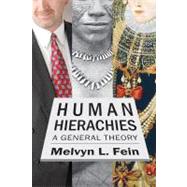Human Hierarchies: A General Theory
, by Fein,Melvyn L.- ISBN: 9781412845960 | 1412845963
- Cover: Hardcover
- Copyright: 6/15/2012
Human beings are hierarchical animals. Always and everywhere, people have developed social ranking systems. These differ dramatically in how they are organied, but the underlying causal mechanisms that create and sustain them are the same. Whether they are on the top or bottom of the heap, people attempt to be superior to some other persons or group. This is the root of Melvyn L. Fein's thesis presented in Human Hierarchies: A General Theory. Fein traces the development of changes from hunter-gatherer times to our own techno-commercial society. In moving from small to large communities, humans went from face-to-face contests for superiority to more anonymous and symbolic ones. Societies evolved from hunting bands where the parties knew each other through big-men societies, chieftainships, agrarian empires, patronage chains, caste societies, estate systems, and market-oriented democracies. Where once small groupings were organied primarily by strong forces such as personal relationships, the now standard large groupings are more dependent on weaker forces such as those provided by social roles. Bureaucracies and professional roles have become prominent. Bureaucracies allow large-scale organiations to maintain control of people by limiting the potential destructiveness of unregulated tests of strength and by clarifying chains of command. Their rigidity and unresponsiveness requires that they be supplemented by professional roles. At the same time, a proliferation of self-motivated experts delegate authority downward, thereby introducing a more flexible decentraliation. This analysis is a unique and significant advance in both the sociology and anthropology of stratification among humans.







